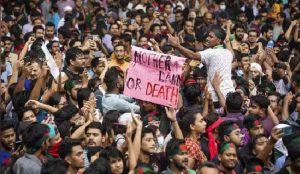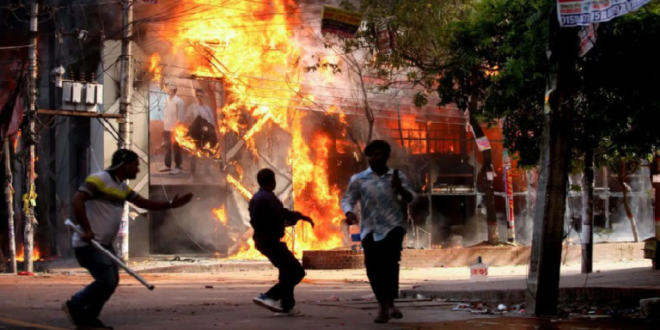06-08-2024
DHAKA: Bangladeshi Prime Minister Sheikh Hasina has resigned after weeks of deadly anti-government protests, putting an end to her more than two decades dominating the country’s politics.
Hasina, 76, fled the country, reportedly landing in India on Monday.
 Jubilant crowds took to the streets to celebrate the news, with some storming the prime ministerial palace, reportedly looting and vandalizing parts of her former residence.
Jubilant crowds took to the streets to celebrate the news, with some storming the prime ministerial palace, reportedly looting and vandalizing parts of her former residence.
Hours after Hasina’s resignation, President Mohammed Shahabuddin ordered the release of jailed former Prime Minister Khaleda Zia and all students detained during recent protests against a quota system for government jobs.
President Shahabuddin said he had chaired a meeting of army chiefs and political representatives.
He said an interim government would be formed, new elections called and a national curfew lifted.
In Dhaka on Monday, police and other government buildings were attacked and set on fire. Protesters attempted to tear down a statue of independence leader Sheikh Mujibur Rahman, Hasina’s father.
Army and police units were deployed across the city. Mobile phone service was reportedly cut off for several hours before being restored.
On Monday, protesters were seen carrying out furniture from the prime minister’s residence.
Dozens were reported killed on Monday, although the precise toll remained unclear. The media reported the toll as 66 dead, though local outlet the Dhaka Tribune said as many as 135 had been killed.
Hasina’s departure leaves a vacuum in Bangladeshi politics, which has long been characterized by a rivalry between her Awami League and the Bangladesh Nationalist Party.
The country has experienced several military coups, most recently in 2007.
 The US commended the army for its “restraint” and said an interim government should be formed. The EU urged an “orderly and peaceful transition” towards a democratically elected government.
The US commended the army for its “restraint” and said an interim government should be formed. The EU urged an “orderly and peaceful transition” towards a democratically elected government.
There was no official reaction from neighbor and regional power India.
Debapriya Bhattacharya, a senior economist with the Centre for Policy Dialogue in Dhaka, told the BBC that while the resignation had been met with “euphoria” in the streets, attacks on the Hindu minority had escalated, posing an immediate challenge to the new authorities.
“There is a feeling that India completely backed Sheikh Hasina’s government. Protesters make no distinction between India and Hindu citizens of Bangladesh, which has already led to attacks on temples and people.
“Now there is a power vacuum, there is nobody to implement law and order. The new government will need to protect religious minorities.”
Hasina’s allies said she would not return to the country’s politics. The former prime minister has spent a total of 20 years in office, first coming to power in 1996.
Her son, Sajeeb Wazed Joy, told media; “she’s in her late 70s. She is so disappointed that after all her hard work, for a minority to rise up against her, I think she’s done.
“My family and I are done.”
Critics say Hasina’s rule was characterized by forced disappearances, extra-judicial killings and the crushing of opposition figures and government critics but Wazed, who also served as an adviser to the prime minister on technology, defended his mother’s record. (Int’l Monitoring Desk)
 Pressmediaofindia
Pressmediaofindia




